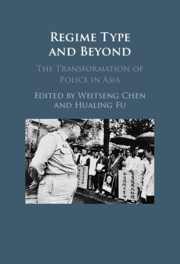Book contents
- Regime Type and Beyond
- Regime Type and Beyond
- Copyright page
- Contents
- Figures
- Tables
- Contributors
- Abbreviations
- Part I Framework
- Part II Authoritarian Policing: Past and Present
- 3 High Policing and Human Rights Lawyering in China
- 4 Transformation in Policing Minor Offending in China
- 5 From Revolutions to COVID-19
- 6 Unrestrained but Limited
- Part III Democratic Transition and Authoritarian Resilience
- Part IV The Singapore and Hong Kong Exceptions
- Part V Conclusions
- Index
6 - Unrestrained but Limited
Policing Vagrancy in Authoritarian Seoul
from Part II - Authoritarian Policing: Past and Present
Published online by Cambridge University Press: 25 May 2023
- Regime Type and Beyond
- Regime Type and Beyond
- Copyright page
- Contents
- Figures
- Tables
- Contributors
- Abbreviations
- Part I Framework
- Part II Authoritarian Policing: Past and Present
- 3 High Policing and Human Rights Lawyering in China
- 4 Transformation in Policing Minor Offending in China
- 5 From Revolutions to COVID-19
- 6 Unrestrained but Limited
- Part III Democratic Transition and Authoritarian Resilience
- Part IV The Singapore and Hong Kong Exceptions
- Part V Conclusions
- Index
Summary
South Korea’s past offers an example of an authoritarian context in which police roles proliferated. Besides maintaining order, police officers in Seoul were deployed for all sorts of purposes. Police were positioned as representatives of a state that had, in the 1960s and 1970s, ambitious plans for remaking society. Seoul’s large underclass posed, in the visions of City Hall and the central government, challenges to those plans. The policing of vagrancy in this period serves as a window onto the interface between state and society. Despite impressive coercive resources, police struggled to impose the state’s demands in managing the streets of Seoul. Instead, they made compromises. In order to attend to their many tasks, police relied on delegates with no formal authority and on irregular procedures. These observations point to a situation of unrestrained power that was also, effectively, limited.
Keywords
- Type
- Chapter
- Information
- Regime Type and BeyondThe Transformation of Police in Asia, pp. 140 - 166Publisher: Cambridge University PressPrint publication year: 2023

